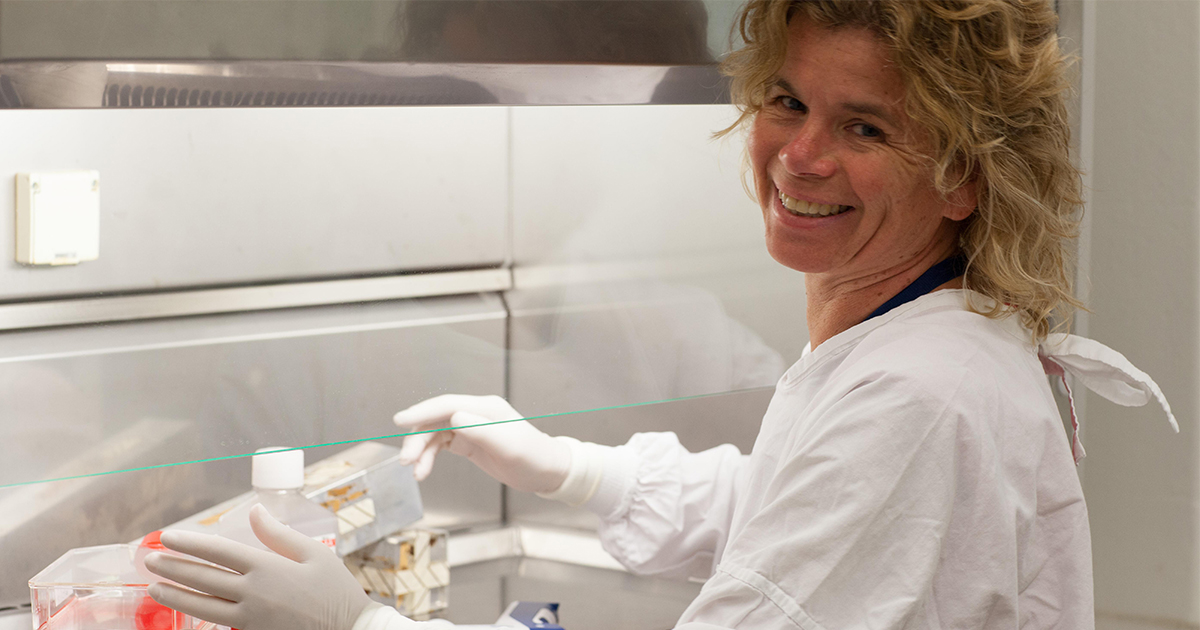The Woolcock Institute of Medical Research

COPD Research: Progress and Promise
Director of the Woolcock’s Emphysema Centre, Distinguished Professor Alaina Ammit, answers our questions about this much-stigmatised disease.
How do you combat the stigma around emphysema?
We need to move away from judgement about health conditions caused by lifestyle factors and be part of a positive conversation about our health. Then, more particularly, we need to ask why is it that we blame people for the health effects of smoking more than other lifestyle factors?
There’s a well-established link between smoking and emphysema but there are also other causes. Global causes of COPD (an umbrella term for restricted airflow – often called emphysema or chronic bronchitis) include occupational exposures, air pollution, biomass burning and bush fires.
Pollution is probably the most important factor and its health impacts are not just for respiratory health. It’s for cardiovascular health, cancer, probably cognitive functions as well. It’s all connected to the exposures we have.
Why focus your research on a disease which attracts so much stigma?
As a scientist, I'm interested in inflammation. In asthma, there’s inflammation but we’ve got good medicines – you can use steroids, they work. For me, we still give steroids for COPD but they don't work as well. That's the question. Why don't they work as well and what can my research do to improve that?
The outcomes for people with COPD drive me, but all clinical practice, all good clinical advances, have to come from very solid basic science. That basic science question is quite an intriguing one.
Is the future of COPD treatment and recommendations likely to become more multidisciplinary?
That’s already started at the Woolcock with our Centre for Chronic Diseases of Ageing looking at COPD, dementia and brain function. We’re thinking about COPD more from that holistic point of view, not just through the lens of respiratory function.
Connections to Macquarie University Hospital and being part of Macquarie University’s Faculty of Medicine will be an important part of that. Having people in different schools across the faculty will allow broader connections and that’s super exciting. Those multidisciplinary, or even interdisciplinary, opportunities will offer different ways of looking at issues and new approaches to our research.
Is there a left-field discipline that will offer new opportunities for COPD research?
Programme design – someone who's focused on the user experience, looking at how people access healthcare, how they think about their health, how they access health information and navigate that journey – can provide us with different ways of thinking.
When you're embedded in research, in the science of a disease, you can sometimes be guilty of only seeing it through that lens. You can be overly scientific and that doesn't really help people understand and incorporate the lifestyle changes that you’re recommending.
Want to stay up to date with our research on sleep and respiratory conditions?
Sign up to our monthly newsletter
A more interdisciplinary way of treating COPD; a broader focus; less judgement about causes of disease; better designed programmes to help people; what else is on your wish list?
Healthy lifestyle promotion which is important across all we do at the Woolcock but also in other diseases as well. Mental health is very important. Our move to Macquarie University, with its very long-standing strength in psychology, will offer great opportunities to address good mental health for healthy living.
Are those things especially important for people with COPD?
No, they apply to all of us.
What is currently happening in COPD research?
COPD is caused by oxidative stress – cigarette smoke, pollution, noxious gases. No matter what the cause, there are commonalities in the disease’s unresponsiveness to drugs that work for asthma.
There’s been a lot of research on oxidative stress and whether you can counteract that and there are more avenues to investigate. We've just completed a major body of work funded by an NHMRC grant where we identified one target and found a molecule that we can switch on that is anti-inflammatory. We need to find pharmacological compounds that can do that, specifically and for a long duration. The principle is there and the potential for controlled COPD, in the same way as asthma, is real.
Is there hope for an effective treatment any time soon?
There has been real progress in the field of COPD research in the past eight to 10 years in terms of looking at targets that may reverse its decline. This is a very active area of research. I believe someone will find the right molecule and the right ways in which to target it in the next 10 years.










